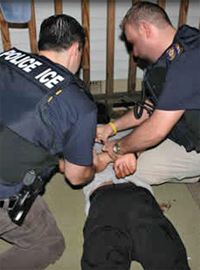| Civil Libertarians and Excessive Post-Boston Angst |
 |
|
By Timothy H. Lee
Thursday, April 25 2013 |
Did America violate the due process rights of the murderous Boston terrorist – we won’t publicly recite his name – by interrogating him prior to itemizing his Miranda rights? The straightforward answer is “no,” and claims to the contrary from some hand-wringing alarmists do not withstand legal or logical scrutiny. To be sure, civil libertarians are right to cast a wary eye on government authority. That was, after all, the basis for the American Revolution itself. Unfortunately, excesses and hyperbole do a disservice to the nation by obfuscating issues and undermining the primary basis for government itself – citizens’ safety and security. In the wake of last week’s Boston violence, we’re currently witnessing a regrettable episode. As is too often the case, retired Judge Andrew Napolitano serves as a breathless exemplar of that excess. In a commentary entitled “Boston and Freedom,” Napolitano labeled post-9/11 security efforts a “pact with the devil” with “agents being told to reject their training and the common understanding of well-regarded constitutional law and interrogate a half-drugged suspect with a hole in his throat whom they were about to charge with mass murder, in utter defiance of Miranda.” One’s heart surely bleeds for the inconvenienced accused. Napolitano further claimed that “radical reinterpretation of the natural and constitutional right to remain silent is unprecedented, terrifying, and disingenuous.” Then, appearing on the Fox Business Network, Napolitano lectured Stuart Varney, “Guess what – the 5th Amendment prevents us from ‘getting’ what we want to get out of him. If you want to suspend his 5th Amendment right, there will be no limit to whose rights you can suspend!” Stepping out even further on the thin limb, he added, “There’s not a scintilla of evidence that these guys had any involvement with any organized group, domestic or foreign.” Well, not exactly. By themselves, the elder brother’s activities and foreign travel constitute “a scintilla of evidence,” enough to trigger a federal investigation and alerts from a foreign government. The sophistication and degree of the brothers’ arsenal also suggest involvement with others, not to mention the fact that men with no obvious source of significant income were able to travel, train and accumulate that weaponry. Whereas other attempted bombers since 9/11 failed due to defective devices, the Boston terrorists were all too successful. That alone at least raises the question of involvement with outsiders. More fundamentally, a great deal of misunderstanding surrounds Miranda and its application, exacerbated by claims like Napolitano’s. First, Miranda concerns the subsequent courtroom admissibility of a defendant’s confessions, statements and evidence derived therefrom. Many people mistakenly assume that Miranda warnings are categorically required upon arrest, but that’s simply not correct. Miranda rights aren’t even implicated if authorities don’t seek to introduce those confessions, statements or other evidence derived from pre-Miranda custodial interrogation. In the instant case, a surplus of evidence already exists for later use at trial. From photo evidence at the bombing to statements made to his carjacking victim to physical evidence obtained, a confession won’t be necessary to convict. In the words of former Attorney General Michael Mukasey, “Giving up your ability to use a confession in this case is like giving up ice in winter.” Second, there exists a “public safety” exception set forth in New York v. Quarles (1984) that allows admission of confessions and other evidence obtained during pre-Miranda interrogation. Courts have not fully defined the extent of the exception, but the underlying logic of “concern for public safety” is at least arguably applicable in this case, given the possibility of such things as other bombs or co-conspirators. Third, authorities can simply resume interrogation after issuing Miranda warnings, and see whether the bomber repeats confessions or other evidentiary statements made previously. The broader and more immediate concern at this point isn’t convicting the bomber, which is effectively certain. Rather, it is critical that we ascertain what he knows of any broader network and his brother’s activities, plus what training enabled them to perfect the explosives, how they were radicalized and who paid for their lifestyles and his brother’s international travel. For that reason, pre-Miranda interrogation is not only legal, but logical. Which brings us to the Obama White House and its muddled response. In explaining its refusal to treat the bomber as an enemy combatant, the Obama White House mixed apples and oranges by saying, “We will prosecute this terrorist through our civilian system of justice. Under U.S. law, United States citizens cannot be tried in military commissions.” But trial before a military tribunal and interrogation of an enemy combatant are two separate things. By conflating the two, and by falsely suggesting deprivation of the bomber’s legal rights, we jeopardize our need to untangle the current attack and prevent future harm. |
Related Articles : |
























